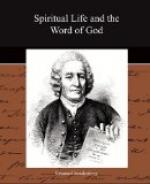Part Fourth—THE DIVINE WORD
I. The Holiness of the Word
It was said of old that the Word is from God, Divinely inspired, and thus holy; and yet it has not been known heretofore where in the Word the Divine is. For the Word appears in the letter like a common writing in a foreign style, and a style not so sublime or so lucid as appears in the writings of the present ages. For this reason a man who worships nature more than God, or in place of God, and thus thinks from himself and what is his own (proprium), and not from the Lord out of heaven, can easily fall into error respecting the Word, and into contempt for it, saying in his heart when he reads it, What is this, or what is that? Is this Divine? Can God who has infinite wisdom speak in this manner? Where is its holiness, and from what source, unless from the religion whose ministers it serves? and other like things. But that it may be known that the Word is Divine, not only in every meaning but also in every expression, its internal sense, which is spiritual, and which is in its external sense, which is natural, as a soul in its body, has now been revealed. This sense can bear witness to the Divinity and consequent holiness of the Word; and can convince even the natural man that the Word is Divine if he is willing to be convinced. (A.E., n. 1065.)
In brief, the Word is Divine truth itself, which gives wisdom to angels and enlightens men. As Divine truth goes forth from the Lord, and as what goes forth is Himself out of Himself, the same as light and heat go forth from the sun and are the sun, that is, are of the sun out of it, and as the Word is Divine truth, it is therefore the Lord, as it is called in John (i. 1-3, 14). In as much as Divine truth, which is the Word, in its descent into the world from the Lord, has passed through the three heavens, it has become accommodated to each heaven, and lastly to men also in the world. This is why there are in the Word four senses, one outside of the other from the highest heaven down to the world, or one within the other from the world up to the highest heaven. These four senses are called the celestial, the spiritual, the natural from the celestial and spiritual, and the merely natural. This last is for the world, the next for the lowest heaven, the spiritual for the second heaven, and the celestial for the third. These four senses differ so greatly from one another that when one is exhibited beside the other no connection can be recognized; and yet they make one when one follows the other; for one follows from the other as an effect from a cause, or as what is posterior from what is prior; consequently as an effect represents its cause and corresponds to its cause, so the posterior sense corresponds to the prior; and thus it is that all four senses make one through correspondences.




